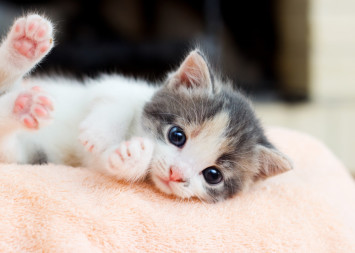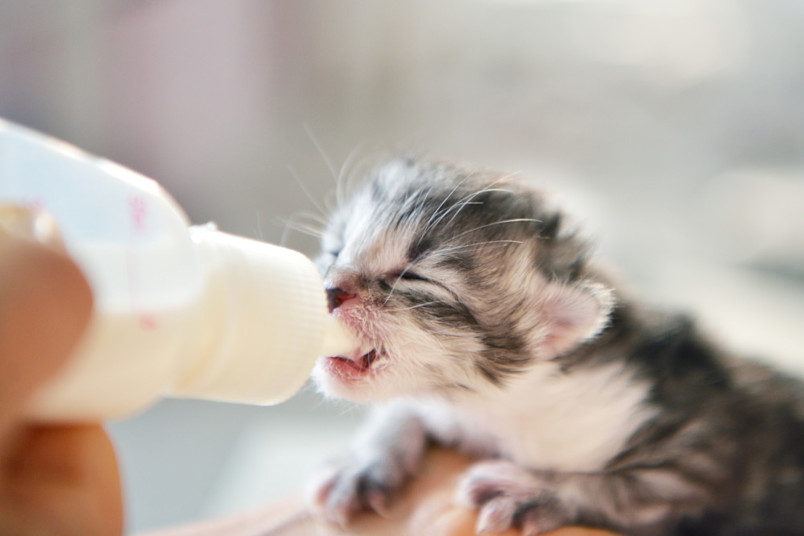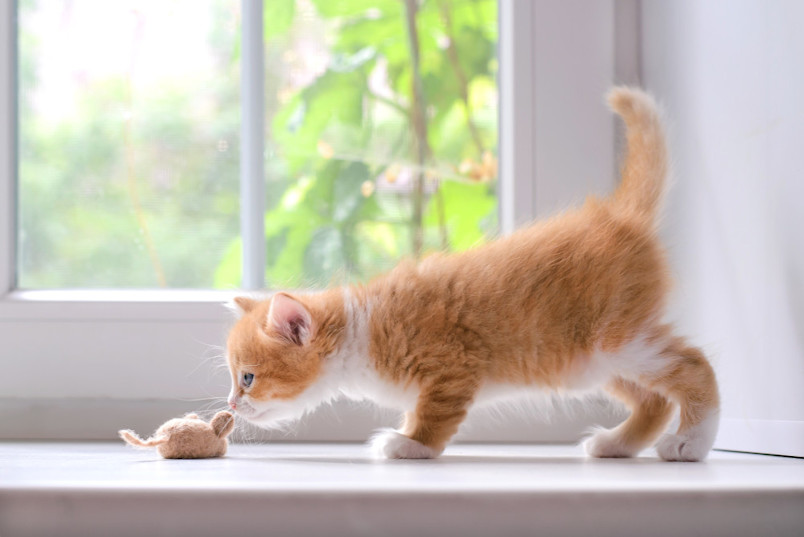
Tiny paws, boundless energy, and wide eyes full of wonder – kittens melt hearts with their charm. But their first months are crucial for laying the foundation for a lifetime of health and happiness.
From essential veterinary care and proper nutrition to crucial behavioral development, these early weeks shape a kitten's future well-being. Typically, a kitten will be able to go to their new home after about 8 weeks of age, at which point you'll need to choose a vet, a healthy kitten diet, litter boxes, and safe toys—then get ready to learn and grow with your new little friend.
Newborn kittens, under 8 weeks old, require extra special consideration. Their needs differ significantly, demanding more preparation and understanding to ensure their health and well-being. If you take on the task of caring for a newborn, you’ll need to learn how to take care of a kitten.
Creating a Warm and Safe Environment for a Kitten
Most healthy 8-week-old kittens can regulate their body temperature, so while providing a cozy and safe space to sleep and play is important, a direct heat source isn’t necessary. Normal room temperature is usually adequate, though in colder climates the space they’re in should be heated to a reasonable temperature.
A heat source is more important for newborn orphaned kittens who can’t regulate their body temperature. If less than 4–6 weeks old, they usually rely on mom and littermates to keep them toasty and comfortable. Without an outside heat source, they’re prone to hypothermia which can be deadly. An ideal setup includes washable bedding (such as small, lightweight fleece blankets), a gentle and controllable heat source that can be placed beneath the blankets (never directly under the kitten), and ample space that does not have any heat source, so if the kitten feels too warm it can freely wriggle away to a cooler space.
Kitten Feeding and Nutrition
Just like humans, proper nutrition is crucial for kittens' health and well-being and is a vital part of knowing how to take care of a kitten. While young kittens rely on their mother's milk, as they wean, it's your responsibility to provide a high-quality diet suited to their breed and age. Consult your veterinarian for personalized recommendations or resources to help you choose the right food for your furry friend. Remember, commercially produced, balanced diets offer consistent and well-researched nutrition for optimal growth and development.
For neonatal kittens who are orphaned, nutrition can’t come from their mother, so a balanced and well researched kitten formula is key. “Cat milk” is not equivalent to formula (it’s just a treat meant for adult cats). Kittens must instead be fed a commercially produced kitten milk replacer, typically via bottle until 3 -4 weeks of age at which point the kitten’s eyes are open, and they can find and lap up the milk replacer from a shallow dish and even get their first introduction of canned kitten food (or dry kitten food softened with water). By 6 weeks of age, they should be fully weaned off milk replacer and can eat quality kitten food full time.
Bottle Feeding Guidelines for Kittens
If you find yourself learning how to take care of a kitten (or multiple) under 4 weeks of age who need to be bottle fed, your vet will be your best resource. You can also reach out to animal shelters that house cats to learn about safe bottle-feeding practices from hands-on experts. The National Kitten Coalition or Alley Cat Allies also have useful educational guides.
Kitten milk replacer should be prepared and given per package label instructions, and feeding volumes and frequencies will depend heavily on kitten age and size, so a small kitchen scale will be a useful tool. The package should provide instructions for how much to feed and how often. Kittens from 3-4 weeks of age will likely need to be exclusively bottle fed, but then weaning can begin. Kittens should be warm, awake, and lively before feeding to avoid potential complications.
Weaning Process (for bottle fed and mother-fed kittens)
Introduction of solid food can begin around 3-4 weeks of age for both bottle fed and mother-fed kittens. Many experts suggest introducing solid food as a ‘gruel’ of canned food or softened dry food mashed and mixed with kitten formula. Amounts of solid food should be small at first but can gradually increase over a week, especially if the kittens are enthusiastic about it. Kitten weaning is messy, so have some pet-safe wipes handy!

Kitten Health and Hygiene
Kittens who have been raised with their mother don’t often need special consideration for health and hygiene. The mother knows how to take care of a kitten, and will groom them to satisfaction, a process that helps stimulate even the youngest of kittens to urinate and defecate.
If bringing home a 6-8 week old kitten, they’ll likely find their way around a litterbox just fine. Ensure it’s in an easily accessible area and that the chosen litter is one they won't be tempted to taste or play in too much.
For younger kittens (whether bottle fed or raised with the mother) litter training can begin around the time that weaning starts. A shocking realization to many is how naturally young kittens adapt to a litter box. It seems an innate habit, though bottle fed kittens may need a little more assistance than their mother-raised counterparts.
If kittens are younger than 3 – 4 weeks old, their body doesn’t yet know how to express urine and feces automatically nor do the kittens have control over their litterbox habits. The technique of stimulating a kitten to urinate and defecate is meant to mimic the mother’s behaviors and is an important part of learning how to take care of a kitten. Many professionals use a cotton ball dampened with warm water to gently dab or swipe over the kittens rear end under the tail and between the hind legs. This mimics the mother’s licking behavior, which should stimulate urination, defecation, or both. This needs to be repeated after every feeding until the kittens are old enough to pass urine and feces on their own, at which point they should be placed in the litter box to go to the bathroom on their own, after every meal.
Monitoring Weight Gain
Any kitten less than 6 weeks old should be weighed every few days to ensure they’re gaining weight. Weight gain may vary between individuals, but consistent weight gain as they grow is a positive sign. Consult your veterinarian for a personalized weighing schedule and weight gain targets specific to your kitten's breed and individual needs.
As older kittens grow, their weight should be checked at every vet visit to ensure their development is appropriate. Your veterinarian will analyze their weight alongside other factors like activity level and body condition to ensure they're on the right track. Don't ignore sudden changes, be it rapid weight loss or gain, as these could indicate underlying issues. Discussing any concerns with your vet promptly is crucial.
Beyond weighing, keeping a record of your kitten's growth over time helps you identify trends and potential issues early on. Choose a calm, comfortable environment for weighing to minimize stress.
Bathing Process
Kittens raised by a mother will often develop their own grooming habits, and even bottle-raised kittens may figure it out on their own, but monitor for cleanliness after mealtimes, and especially around the rear end after using the litter box. Most kittens don’t need to be bathed unless heavily soiled, and if not done carefully, a bath can be dangerous. Common complications from unnecessary bathing may include water or soap aspiration, skin conditions, or even hypothermia.
An important part of knowing how to take care of a kitten is learning how to bathe a kitten if necessary. Use warm water that you can hold your hand under for a long time without discomfort. Kittens should never be submerged and water shouldn’t be run over their faces. Only plain, gentle pet-safe shampoos should be used, never flea/tick shampoos or medicated shampoos (unless prescribed and dispensed by the kitten’s veterinarian) for a specific condition.
Because they can become hypothermic quickly, kittens should be gently but thoroughly dried and placed in a warm and comfortable space after the bath. Using a fan can cause their body temperature to drop rapidly, which is dangerous. Hair dryers are not temperature controlled well and can either lead to hypothermia (if on the cool setting) or hyperthermia and even burns if on a warm setting. Placing them in a draft-free space with cozy bedding should be sufficient to keep older kittens comfortable after a bath. Neonatal kittens shouldn’t need full baths and can often be cleaned off with gentle wipes alone. If fully bathed, they need to be thoroughly dried and placed back on a heat source as soon as the bath is completed.
Kitten Socialization and Play
Many people believe cats “just behave like cats” normally, but they learn a lot of important behaviors from interacting with their mother, littermates, and other humans and animals in their environment.
Kittens should be left with their mother until about 8 weeks old, when they can transition into a new household. Everyone in the new household should be conscientious about their interactions with the kitten.
Fear-inducing or traumatizing events should be avoided, so young children should always be supervised in their interactions and older children should be monitored to ensure the kitten isn’t accidentally put at risk.
Rough play with human adults or children is never recommended, as they may grow to associate humans with aggressive play, leading to injuries as the kitten grows into a full-sized cat who still wants to scratch and bite in the same way they did when they were small.
Interactions with other healthy and vaccinated animals are recommended, to help kittens grow to understand how to socialize with other animals.
Kitten play is also important for development and is key to raising a cat who is emotionally and mentally healthy. Normal cat behaviors like scratching, digging, running, and climbing should be encouraged as space allows, with cat-safe toys, scratching posts or blocks, towers or trees, or even safely wall-mounted jungle-gym setups. Not all of these are a requirement, but cats need external stimulation and places to act out natural behaviors so as many accommodations should be made as possible. Learning how to take care of a kitten can be overwhelming. When do kittens calm down? When kittens are given appropriate behavioral outlets, they will grow into calmer cats, but the process does take some time.

Monitoring Kitten Health and Development
Early veterinary visits are key to starting a kitten's health off right. Your vet will perform a physical examination, recommend lifestyle-specific vaccinations, and check your kitten out for any sign conditions that need to be managed.
Taking care of a kitten means making sure they are protected. If you're a new cat parent wondering about when do kittens get their first shots and what vaccines your kitten needs, and when to schedule them. Our detailed vaccine guide will help you understand the complete timeline for protecting your new furry friend. These early vet visits are a great time to consider cat insurance, which can help cat owners manage the cost of veterinary care associated with illness or injury. In many cases, this kind of coverage can be life-saving.
Life with kittens can be unpredictable. A simple ear infection or a playful tumble could lead to a vet visit. Kittens under 8 weeks are particularly susceptible to health concerns, from developing their immune systems to navigating new environments. Embrace pet insurance helps you manage the cost of unexpected care, so you can focus on what matters most – cuddles and playtime with your furry friend.
Remember, pet insurance works best when you start early. Pre-existing conditions aren't covered, so getting coverage before your kitten develops any health concerns ensures they're protected from day one.
In addition to regular pet insurance, a pet wellness plan can even help budget for the cost of routine healthcare, including vaccinations. Kitten shots typically include feline distemper (given every couple of weeks until 4 months old), Rabies (given at about 4 months of age), and other vaccines including Feline Leukemia.
Preparing to Adopt a Kitten
Adopting a kitten is a joyful experience, but before you dive into the world of adorable meows and playful pounces, there are some key things to consider. When you’re choosing a kitten, look at:
Physical Appearance: A healthy kitten has bright, clear eyes, a clean coat free of matting or fleas, and no discharge from the nose or ears. Their body shouldn't be bony but shouldn't have a distended belly either. Playful energy is good, but lethargy or hiding can indicate sickness.
Socialization: Look for a kitten comfortable being handled, purring, and engaging with you. Observe how they interact with their siblings and mother (if available). Shy kittens can blossom, but excessive fearfulness might require more patience.
Temperament: Kittens come in all personalities! Consider your lifestyle. Do you want a cuddly lap cat or an energetic explorer? Observe their interactions with toys and people to find a kitten that complements your energy level.
Veterinary care also should be planned early – the kitten may have already received some early veterinary care if the original caretaker took them in for a checkup before adoption. Even if that visit was recent, establishing care with their new veterinarian is an important thing for the new caretakers to arrange early. The veterinarian can help guide healthcare decisions like vaccination protocols, feeding and play habits, monitoring for signs of non-wellness, and making arrangements for spaying/ neutering to prevent unwanted litters and avoid unfortunate health consequences.

The Benefit of Good Preparation for your Kittens
Bringing a kitten home can be a truly rewarding experience, filling your life with years of companionship and countless purrs. But before you dive headfirst, remember, it's a responsibility. Like any family member, your feline friend deserves the best care possible.
Preparation is key! Resources like pet insurance can offer peace of mind when unexpected vet bills arise. Regular checkups and proper nutrition ensure your kitten thrives, and consulting professionals can guide you through any questions or concerns.
Think of it as an investment in a lifetime of cuddles, playful moments, and unconditional love. With a little planning and the right tools, you're not just adopting a kitten, you're creating a bond that will enrich both your lives. So, get ready to open your heart and home to a furry friend, and prepare to give them the happy, healthy life they deserve.